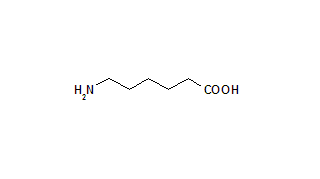Aminocaproic acid
Aminocaproic acid (marketed as Amicar) is a drug used to treat bleeding disorders. more...
Mechanism of action
Aminocaproic acid works as an antifibrinolytic. It is a derivative of the amino acid lysine. It binds reversibly to the kringle domain of plasminogen and blocks the binding of plasminogen to fibrin and its activation to plasmin.
Clinical use
Aminocaproic acid is used to treat excessive postoperative bleeding. It can be given orally or intravenously. One scenario where it may be useful is to treat bleeding after dental extractions in patients with hemophilia, because the oral mucosa is rich in plasminogen activators. A meta-analysis found that lysine analogs like aminocaproic acid significantly reduced blood loss in patients undergoing coronary artery bypass grafting.
Side effects
Its side effects are mainly related to the gastrointestinal tract and include nausea, vomiting, abdominal pain, and diarrhea. The main risk associated with aminocaproic acid is the increased risk for thrombosis because of the inhibition of fibrinolysis.
Read more at Wikipedia.org



